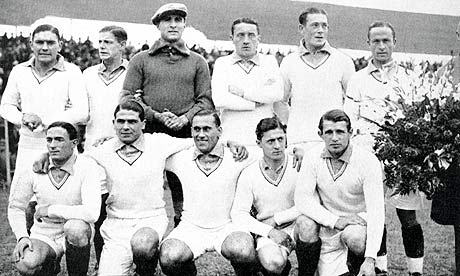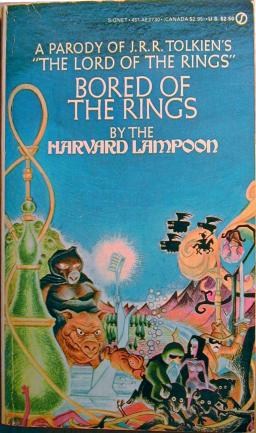
Also you could buy the book!




 Good people of the internet, you can read my story (novelette, if you want to get technical) "Wizard's Six" at the F&SF web site. Its younger sibling "Dragon's Teeth" appeared in the December 2009 issue of that illustrious magazine and is shortly to reappear in a couple of best-of-2009 anthologies...
Good people of the internet, you can read my story (novelette, if you want to get technical) "Wizard's Six" at the F&SF web site. Its younger sibling "Dragon's Teeth" appeared in the December 2009 issue of that illustrious magazine and is shortly to reappear in a couple of best-of-2009 anthologies...
In the clear blue skies above Long Island, two airplanes collide. Tony Stark watches the scene in horror and wishes he had the technology that is almost within his reach—a new hyperintelligent instant control system that could have given the aircraft advance warning. But Stark, an obsessive, increasingly troubled recluse, doesn’t know that his invention has been compromised.
In fact, the collision was a carefully crafted hit on Madame Hydra, the final stage in Arnim Zola’s plan to seize control of HYDRA and get rid of Iron Man once and for all. The cunning adversary has already infiltrated Stark Industries security to develop a version of the instant control mechanism that will take over the armored suit and turn it against Stark and S.H.I.E.L.D. While Tony races to track down the source of the intrusion, Zola unleashes direly ingenious computer viruses and the ultimate secret weapon: a murderous clone army based on Stark’s most trusted friend. A puppet master of self-replicating terror, Zola is plunging a city into a war that threatens to consume all in its wake.
 For a while I was convinced that the story of Joe Gaetjens, who scored the only goal in the US' famous 1-0 victory over England at the 1950 World Cup and then later died at the hands of Papa Doc Duvalier and/or the Tonton Macoutes, was just about the most interesting soccer biography around.
For a while I was convinced that the story of Joe Gaetjens, who scored the only goal in the US' famous 1-0 victory over England at the 1950 World Cup and then later died at the hands of Papa Doc Duvalier and/or the Tonton Macoutes, was just about the most interesting soccer biography around.
 I haven't listened to the whole thing yet, but this audio version of Batman: Inferno is a blast so far. Makes the commute fly by; if you don't believe me, listen to a sample. (Also kind of makes me want to write other Batman stuff, especially if I get to play with the Joker again...)
I haven't listened to the whole thing yet, but this audio version of Batman: Inferno is a blast so far. Makes the commute fly by; if you don't believe me, listen to a sample. (Also kind of makes me want to write other Batman stuff, especially if I get to play with the Joker again...)
I guess what a lot of readers don’t know is that high-profile authors of original fiction have written tie-in work in the past. Christopher Priest (of The Prestige fame) wrote a tie-in novel to accompany the David Cronenberg movie eXistenZ. World Fantasy Award winner Robert Holdstock has written tie-in fiction. James Blish novelised Star Trek. Jack Yeovil was a pseudonym of Kim Newman, who wrote many well-received Warhammer books. The list goes on...
 I was in my 8th-grade algebra class at West Middle School in Ypsilanti, Michigan, where between intense Rubik's Cube competitions with Calin Pintilie I was reading a book called Bored of the Rings, a deliciously vulgar little spoof on Tolkien's masterpiece done by the editors and cronies of the Harvard Lampoon (whose magazine we all used to covet for its inevitable topless shot somewhere toward the back).
I was in my 8th-grade algebra class at West Middle School in Ypsilanti, Michigan, where between intense Rubik's Cube competitions with Calin Pintilie I was reading a book called Bored of the Rings, a deliciously vulgar little spoof on Tolkien's masterpiece done by the editors and cronies of the Harvard Lampoon (whose magazine we all used to covet for its inevitable topless shot somewhere toward the back).

What matters in Buyout is the increasingly frantic collision of morals and beliefs into one another, until a crescendo of an ending the simultaneously denigrates and exalts the notion of an absolute credo.
I was at a loss on how to place this book -- everything needs some kind of context -- but I eventually remembered one of the classics of science fiction's Golden Age, The Space Merchants by Frederik Pohl and C. M. Kornbluth, two of the period's great satirists. Buyout is the same order of beast, bitter, Swiftian satire, loaded and pointed right at us.



In an Associated Press interview in Portland, Snowe said it would be unfair to include a government-run health insurance option that would take effect immediately.
"If you establish a public option at the forefront that goes head-to-head and competes with the private health insurance market ... the public option will have significant price advantages," she said.

 This is a bit of a surprise (a pleasant one). Analog, that venerable bastion of the genre, reviews Buyout in this month's Reference Library column. There are also interesting thoughts about new books from Rudy Rucker (with whom I apparently share a birthday) and Alan Dean Foster.
This is a bit of a surprise (a pleasant one). Analog, that venerable bastion of the genre, reviews Buyout in this month's Reference Library column. There are also interesting thoughts about new books from Rudy Rucker (with whom I apparently share a birthday) and Alan Dean Foster.But any self-sacrifice feels to us westerners like tyranny. We're not ready for it. Our evolution into apex individualists has superbly attuned us to injustices against us while atrophying our awareness of the vastly greater number that work in our favour.
Wired's Bruce Sterling offers a list of Eighteen Challenges in Contemporary Literature, some of which are sensible, others of which - like this one - are, well ... Step away from the computer, Bruce.
Algorithms and social media replacing work of editors and publishing houses ...
It used to be a central ambition of novelists to capture the experience of working life. From Balzac to Zola, Dickens to Kafka, they evoked the dynamism and the beauty, the horror and the tedium of the workplace. Their books covered the same territory as is today featured at copious length in the financial pages of newspapers or in the breathless commentaries of the 24-hour newscasters, but their interest was not primarily financial. The goal was to convey the human side of commerce, where money is only one actor in a complex drama about our ambitions and reversals.
Yet today's writers seem to be losing their nerve. There has been an unfortunate inward turn. Attention, brilliant though it might be, too often falls merely on the domestic and the natural.
When a new writer like Joshua Ferris does finally devote a novel to tracking the antics inside a corporation, the critical reaction is peculiar and telling: he attracts renown and praise for his courage in tackling the fresh and entirely unexpected subject matter of going to the office.

 Today CNN discovers that the future ain't what it used to be. What they don't seem to have noticed is that no future is what it was used to be, because it was never supposed to be that future in any real, predictive sense. Ask any science fiction writer. The key word in the phrase "science fiction future" is fiction. (Futurists are a different breed of cat, but would still, I think, admit they're doing thought experiments rather than concrete predictions.) But I still want a jetpack, and I want teleportation of things more substantial than photons. Stupid future.
Today CNN discovers that the future ain't what it used to be. What they don't seem to have noticed is that no future is what it was used to be, because it was never supposed to be that future in any real, predictive sense. Ask any science fiction writer. The key word in the phrase "science fiction future" is fiction. (Futurists are a different breed of cat, but would still, I think, admit they're doing thought experiments rather than concrete predictions.) But I still want a jetpack, and I want teleportation of things more substantial than photons. Stupid future.

 Over at the Poetry Foundation, GalleyCat's Jason Boog (with whom I gabbed at NYCC earlier this year) has written a fine article, "And Wow He Died As Wow He Lived," about one of American poetry's most undervalued figures, Kenneth Fearing. Check it out. (Also, check out the Complete Poems, published by the University of Maine's own National Poetry Foundation.)
Over at the Poetry Foundation, GalleyCat's Jason Boog (with whom I gabbed at NYCC earlier this year) has written a fine article, "And Wow He Died As Wow He Lived," about one of American poetry's most undervalued figures, Kenneth Fearing. Check it out. (Also, check out the Complete Poems, published by the University of Maine's own National Poetry Foundation.)Even if Mars has never had life, comets and asteroids that have struck the planet should have scattered at least some organic molecules - though not produced by life - over its surface.
Some have suggested that organics were cleansed from the surface by naturally occurring, highly reactive chemicals such as hydrogen peroxide. Then last year, NASA's Phoenix lander, which also failed to detect organics on Mars, stumbled on something in the Martian soil that may have, in effect, been hiding the organics: a class of chemicals called perchlorates.
At low temperatures, perchlorates are relatively harmless. But when heated to hundreds of degrees Celsius they release a lot of oxygen, which tends to cause any nearby combustible material to burn. For that very reason, perchlorates are used in rocket propulsion.
The Phoenix and Viking landers looked for organic molecules by heating soil samples to similarly high temperatures to evaporate them and analyse them in gas form. When Douglas Ming of NASA's Johnson Space Center in Houston, Texas, and colleagues tried heating organics and perchlorates like this on Earth, the resulting combustion left no trace of organics behind.
 I'm still not sure how I feel about the emergence and current procedures of Google Books, but if you'd like to get a look at an extended chunk of Buyout before you plunk down your hard-earned money, here's the preview. It's almost two-thirds of the book, which initially annoyed me; as I looked through it, though, it seemed that whoever made the decisions about what not to include was fairly respectful about not giving away critical moments. So have a look.
I'm still not sure how I feel about the emergence and current procedures of Google Books, but if you'd like to get a look at an extended chunk of Buyout before you plunk down your hard-earned money, here's the preview. It's almost two-thirds of the book, which initially annoyed me; as I looked through it, though, it seemed that whoever made the decisions about what not to include was fairly respectful about not giving away critical moments. So have a look.
 Gawker World Domination Media's SF outpost, the always-interesting io9, takes a look at Buyout and likes what it sees:
Gawker World Domination Media's SF outpost, the always-interesting io9, takes a look at Buyout and likes what it sees:For all the drama and high-concept, Buyout is a remarkably understated and thoughtful novel. The story is rife with dark humor but Irvine reserves the sharpest of his satiric barbs for the voice of "Walt Dangerfield", self-appointed Gonzo Journalist/Greek Chorus, whose daily podcasts introduce each chapter and serve as exposition for the world of 2040 at large. At first glance, the cover art reminded me of Richard K. Morgan's very cool Market Forces (I know, I know, don't judge a book...) But you won't find cartoony evil corporations or blockbuster action here. Nor is the technology portrayed much flashier than what we see around us now. Martin wrestles with ethical dilemmas and social issues, not gun-festooned cyborgs. Buyout lacks many of the obvious trappings of a genre novel, but it does what any well-written Science Fiction book should. It makes you think; about life and death, ethics and society, justice and loyalty — and about the cynic and the idealist, and how sometimes they can be the same person. (read the rest)
 A couple of other interesting things. The new Conjunctions is called "Betwixt the Between," and follows up on that august journal's "New Wave Fabulists" issue from a few years back. It's advertised as "[p]ostfantasy fictions that begin with the premise that the unfamiliar or liminal really constitutes a solid ground on which to walk." The lineup looks terrific. I can't wait to read it. Plus it ought to give Hal Duncan something else to think about during his extended cogitations about the differences between various genres and modes of narrative.
A couple of other interesting things. The new Conjunctions is called "Betwixt the Between," and follows up on that august journal's "New Wave Fabulists" issue from a few years back. It's advertised as "[p]ostfantasy fictions that begin with the premise that the unfamiliar or liminal really constitutes a solid ground on which to walk." The lineup looks terrific. I can't wait to read it. Plus it ought to give Hal Duncan something else to think about during his extended cogitations about the differences between various genres and modes of narrative. Eric Brown thinks you should read it: "Everything about this novella is delightful: its breezy telling, the touching relationship between Ken and Fara, the deadpan humour, the casually fatalistic denouement. Wonderful."
Eric Brown thinks you should read it: "Everything about this novella is delightful: its breezy telling, the touching relationship between Ken and Fara, the deadpan humour, the casually fatalistic denouement. Wonderful."